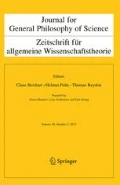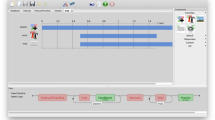Abstract
On the relation between experiment and thought experiment in the natural sciences. To understand the reciprocal autonomy and complementarity of thought and real experiment, it is necessary to distinguish between a ‘positive’ (empirical or formal) and a transcendental perspective. Empirically and formally, real and thought experiments are indistinguishable. However, from a reflexive-transcendental viewpoint thought experiment is at the same time irreducible and complementary to real experiment. This is due to the fact that the hypothetical-anticipatory moment is in principle irreducible to physical reality—even though it refers to physical reality and is bound with the empirical use of our understanding. The presence of counterfactuals is the condition of the possibility for thought experiments to become in principle real ones, by means of a series of technical realisations that gradually approximate the idealisations that they contain.
Similar content being viewed by others
References
Achinstein P., Hannaway O. (eds) (1985). Observation, experiment, and hypothesis in modern physical science. Cambridge, MA, MIT Press
Ackermann R.J. (1985). Data, instruments, and theory: A dialectical approach to understanding science. Princeton, Princeton University Press
Atkinson D. (2003). Experiments and thought experiments in natural science. In: Galavotti M.C. (eds) Observation and experiment in the natural and social sciences. Dordrecht, Kluwer, pp. 209–225
Atkinson D., Peijnenburg J. (2004). Galileo and prior philosophy. Studies in History and Philosophy of Science 35, 115–136
Arthur R. (1999). On thought experiments as a priori science. International Studies in the Philosophy of Science 13, 215–229
Bishop M.A. (1999). Why thought experiments are not arguments. Philosophy of Science 66, 534–541
Boniolo G. (1997). On a unified theory of models and thought experiments in natural sciences. International Studies in the Philosophy of Science 10(2): 121–142
Brown J.R. (1986). Thought experiments since the scientific revolution. International Studies in the Philosophy of Science 1, 1–14
Brown J.R. (1991a). Laboratory of the mind: Thought experiments in the natural sciences. London, Routledge
Brown, J. R. (1991b). Thought experiments: A platonic account. In T. Horowitz & G. J. Massey (Eds.) 119–128.
Brown, J. R. (1993). Why empiricism won’t work. In D. Hull et al. (Eds.) pp. 271–279.
Brown J.R. (1997). Proofs and pictures. The British Journal for the Philosophy of Sciences 48, 161–180
Brown J.R. (2004). Why thought experiments transcend empiricism. In: Hitchcock C. (eds) Contemporary debates in philosophy of science. Malden, Blackwell, pp. 23–43
Bunzl M. (1996). The logic of thought experiments. Synthese 106, 227–240
Buschlinger W. (1993). Denk-Kapriolen? Gedankenexperimente in Naturwissenschaften, Ethik und Philosophy of Mind. Würzburg, Königshausen+Neumann
Buzzoni, M. (1986a). Semantica, ontologia ed ermeneutica della conoscenza scientifica. Saggio su T.S. Kuhn, Mailand: Angeli.
Buzzoni M. (1986b). ‘L’operazionismo e il problema dei termini teorici. Epistemologia 9, 39–76
Buzzoni M. (1995). Scienza e tecnica. Teoria ed esperienza nelle scienze della natura. Rom, Studium
Buzzoni M. (1997). Erkenntnistheoretische und ontologische Probleme der theoretischen Begriffe. Journal for General Philosophy of Science 28, 19–53
Buzzoni M. (2004). Esperimento ed esperimento mentale. Mailand, Angeli
Buzzoni, M. (2005). Kuhn und Wittgenstein: Paradigmen, Sprachspiele und Wissenschaftsgeschichte. In F. Stadler, M. Stöltzner (Hrsg.), Zeit und Geschichte/time and history (pp. 38–40). Kirchberg a.W.: Ludwig Wittgenstein Gesellschaft.
Cartwright N. (1983). How the laws of physics lie. Oxford, Oxford Univ. Press
Cartwright N. (1989). Nature’s capacities and their measurement. Oxford, Oxford Univ. Press
Dingler H. (1928). Das Experiment. Sein Wesen und seine Geschichte. München, Reinhardt
Dingler H. (1930). Das System. Das philosophisch-rationale Grundproblem und die exakte Methode der Philosophie. München, Reinhardt
Dingler H. (1938). Die Methode der Physik. München, Reinhardt
Dingler H. (1955). Die Ergreifung des Wirklichen. München, Eidos
Einstein A., Podolsky B., Rosen N. (1935). Can quantum-mechanical description of physical reality be considered complete?. Physical Review 47, 777–780
Forge, J. (1991). Thought experiments in the philosophy of physical science. In T. Horowitz & G. J. Massey (Eds.) pp. 209–222.
Galison P. (1987). How experiments end. Chicago, University of Chicago Press
Galison P. (1988). History, philosophy, and the central metaphor. Science in Context 2, 197–212
Gendler T.S. (1998). Galileo and the indispensability of scientific thought experiment. The British Journal for the Philosophy of Science 49, 397–424
Gendler T.S. (2000). Thought experiment. On the power and limits of imaginary cases. New York, Garland
Genz H. (1999). Gedanken-experimente. Weinheim, Wiley-VCH
Giere R.N. (1988). Explaining science: A cognitive approach. Chicago, University of Chicago Press
Gooding D. (1982). Empiricism in practice: Teleology, economy, and observation in Faraday’s physics. Isis 73, 46–67
Gooding D. (1990). Experiment and the making of meaning. Human agency in scientific observation and experiment. Dordrecht, Kluwer
Gooding D. (1992). The procedural turn; or, why do thought experiments work?. In: Giere R. (eds) Cognitive models of science. Minneapolis, University of Minnesota Press, pp. 45–76
Gooding, D. (1993). What is experimental about thought experiments? In D. Hull et al. (Eds.) pp. 280–290.
Gooding D. (1994). Imaginary science. The British Journal for the Philosophy of Science 45, 1029–1045
Gooding, D. (1998). Picturing experimental practice. In Heidelberger & Steinle (Hrsg.) pp. 298–322.
Hacking I. (1983). Representing and intervening: introductory topics in the philosophy of natural science. Cambridge, Cambridge University Press
Hacking I. (1992). The self-vindication of the laboratory sciences. In: Pickering A. (eds) Science as practice and culture. Chicago, University of Chicago Press, pp. 29–64
Hacking, I. (1993). Do thought experiments have a life of their own? Comments on James Brown, Nancy Nersessian and David Gooding. In D. Hull et al. (Eds.) 302–308.
Hacking I. (1999). The social construction of what?. Cambridge, Harvard University Press
Heidelberger, M. & Steinle, F. (hrsg.): 1998, Experimental Essays – Versuche zum Experiment. Baden-Baden: Nomos.
Hempel C.G. (1965). Aspects of scientific explanation and other essays in the philosophy of science. New York, Free Press
Hintikka J. (1988). What is the logic of experimental inquiry?. Synthese 74, 173–188
Hintikka, J. (1993). Theory-ladenness of observations as a test case of Kuhn’s approach to scientific inquiry. Hull et al. (Eds.) pp. 277–286.
Hon, G. (1998). If this be error. Probing experiment with error. In M. Heidelberger & F. Steinle (Hrsg.) 1998, pp. 227–248.
Horowitz T., Massey G.J. (eds) (1991). Thought experiments in science and philosophy. Savage MD, Rowman & Littlefield
Hull, D., Forbes, M., & Okruhlik, K. (Eds.). (1993). PSA 1992, 2, Philosophy of Science Association, East Lansing, MI.
Irvine, A. D. (1991). Thought experiments in scientific reasoning. In T. Horowitz & G. J. Massey (Eds.) pp. 149–166.
Janis, A. I. (1991). Can thought experiments fail? In T. Horowitz & G. J. Massey (Eds.) pp. 113–118.
Koyré A. (1939). Études galiléennes. Paris, Hermann
Kuhn, Th. S. (1962). The structure of scientific revolutions. Chicago: University of Chicago Press. zit. nach d. 2. Aufl., 1970.
Kuhn, Th. S. (1964). A function for thought experiments. In R. Taton et I. B. Cohen (dir.), L’aventure de la science, Mélanges Alexandre Koyré. vol. II, Paris: Hermann, 307–337; wiedergedruckt in u. zit. nach T.S. Kuhn, The Essential Tension: Selected Studies in Scientific Tradition and Change. Chicago (Ill.): University of Chicago Press. 1977, 240–265, dt. Üb.: Die Entstehung des Neuen. Frankfurt a.M: Suhrkamp, 1977, 327–356.
Kühne U. (2005). Die Methode des Gedankenexperiments. Frankfurt a.M, Suhrkamp
Laymon, R. (1985). Idealizations and the testing of theories by experimentation. In P. Achinstein & O. Hannaway (Eds.) pp. 147–173.
Laymon, R. (1991). Thought experiments by Stevin, Mach and Gouy: Thought experiments as ideal limits and as semantic domains. In T. Horowitz & G. J. Massey (Eds.) pp. 167–191.
Mach, E. (1883). Die Mechanik in ihrer Entwickelung. Historisch-kritisch dargestellt, Leipzig: Brockhaus zit. nach der 9. Aufl., Leipzig 1933.
Mach E. (1896/1897). Über Gedankenexperimente. Zeitschrift für den physikalischen und chemischen Unterricht 10, 1–5
Mach, E. (1905a). Über Gedankenexperimente. Erkenntnis und Irrtum. Leipzig: Barth. zit. nach der 5. Aufl., 1926, 183–200.
Mach, E. (1905b). Das physische Experiment und dessen Leitmotive. Erkenntnis und Irrtum. Leipzig: Barth. zit. nach der 5. Aufl., 1926, 201–219.
Mach, E. (1905c). Die Hypothese. Erkenntnis und Irrtum, Leipzig: Barth. zit. nach der 5. Aufl., 1926, 232–250.
McAllister J. (1996). The evidential significance of thought experiments in science. Studies in History and Philosophy of Science 27, 233–250
McMullin E. (1985). Galilean idealization. Studies in History and Philosophy of Science 16, 247–273
Miščević N. (1992). Mental models and thought experiments. International Studies in the Philosophy of Science 6, 215–226
Nersessian, N. (1991). Why do thought experiments work? Proceedings of the Cognitive Science Society, 13, Lawrence Erlbaum, Hillsdale (NJ), 430–438.
Nersessian, N. (1992). How do scientists think? Capturing the dynamics of conceptual change in science. R. Giere (Ed.), Cognitive models of science, (pp. 3–44). Minneapolis: University of Minnesota Press.
Nersessian, N. (1993). In the theoretician’s laboratory: Thought experimenting as mental modeling. Hull et al. (Eds.) pp. 291–301.
Norton, J. (1991). Thought experiments in Einstein’s work. In T. Horowitz & G. J. Massey (Eds.) pp. 129–148.
Norton J. (1996). Are thought experiments just what you Thought?. Canadian Journal of Philosophy 26, 333–366
Norton J. (2004). Why thought experiments do not transcend empiricism. In: Hitchcock C. (eds) Contemporary debates in philosophy of science. Malden, Blackwell, pp. 44–66
Nowak, L. (1971). U podstaw marksowskiej metodologii nauk, Warszawa: Państwowe Wydawnictwo Naukowe.
Nowak, L. (1992). The idealizational approach to science: A survey. In J. Brzeziński, & L. Nowak, Idealization III. Approximation and truth. (pp. 9–63). Amsterdam: Rodopi.
Palmieri P. (2003). Mental models in Galileo’s early mathematization of nature. Studies in History and Philosophy of Science 34, 229–264
Popper, K. R. (1959). The logic of scientific discovery. London: Hutchinson. zit. nach der 2. Aufl. 1968.
Poser, H. (1984). Wovon handelt ein Gedankenexperiment? H.P. Poser & H.-W. Schütt (hrsg.), Ontologie und Wissenschaft. Philosophische und wissenschaftstheoretische Untersuchungen zur Frage der Objektkonstitution (Technische Universität Berlin) 19, 181–198.
Radder H. (1988). The material realization of science. Assen, van Gorckum
Radder H. (1996). In and about the world. Philosophical studies of science and technology. New York, State University of New York Press
Schlesinger G.N. (1996). The power of thought experiments. Foundations of Physics 26, 467–482
Sexl R.U., Urbantke H.K. (1975). Gravitation und Kosmologie. Eine Einführung in die Allgemeine Relativitätstheorie. Zürich, Bibliographisches Institut
Sorensen Roy A. (1992). Thought experiments. Oxford, Oxford University Press
Stäudner, F. (1998). Virtuelle Erfahrung. Eine Untersuchung über den Erkenntniswert von Gedankenexperimenten und Computersimulationen in den Naturwissenschaften. Diss. Friedrich-Schiller-Universität, Jena.
Stöltzner M. (2002). The dynamics of thought experiments – comments to Atkinson. http://philsci-archive.pitt.edu/documents/disks0/00/00/06/26, 17.12.2002.
Weber, M. (1904). Die‘Objektivität’ sozialwissenschaftlicher und sozialpolitischer Erkenntnis. Archiv für Sozialwissenschaft und Sozialpolitik, 19, 22–87, wiederabgedruckt in Gesammelte Aufsätze zur Wissenschaftslehre, Mohr, Tübingen, 1922, zit. nach der 5. Aufl., 1982, 146–214.
Weber, M. (1906). Kritische Studien auf dem Gebiet der kulturwissenschaftlichen Logik. Archiv für Sozialwissenschaft und Sozialpolitik, 22, 143–207, wiederabgedruckt in Gesammelte Aufsätze zur Wissenschaftslehre, Mohr, Tübingen, 1922, zit. nach der 5. Aufl., 1982, 215–290.
Witt-Hansen J. (1976). H. C. Örsted, Immanuel Kant, und the thought experiment. Danish Yearbook of Philosophy 13, 48–65
Author information
Authors and Affiliations
Corresponding author
Additional information
Die Hauptthesen des vorliegenden Beitrags wurden im Jahre 2004 während eines Forschungsaufenthalts in Marburg als Stipendiat der Alexander von Humboldt-Stiftung erarbeitet. Der Stiftung und meinem wissenschaftlichen Gastgeber, Herrn Prof. Dr. Peter Janich, gilt mein innigster Dank. Auch Herrn Prof. Dr. Wilhelm Baumgartner möchte ich meinen verbindlichen Dank aussprechen, nicht nur weil er mir bei 2003 durchgeführten bibliographischen Recherchen in Würzburg sehr behilflich war, sondern auch für seine Einladung zu einer Forschungsarbeit über “Gedankenexperiment und Intentionalität”, die diesen Beitrag als Ausgangspunkt der gemeinsamen Arbeiten im Sommer 2006 angeregt hat. Für die Unterstützung dieser Forschungsarbeit ist erneut der Alexander von Humboldt-Stiftung zu danken. Für ihre Empfehlungen zu sprachlichen Verbesserungen bedanke ich mich bei Frau Ingeborg Donhauser.
Rights and permissions
About this article
Cite this article
Buzzoni, M. Zum Verhältnis zwischen Experiment und Gedankenexperiment in den Naturwissenschaften. J Gen Philos Sci 38, 219–237 (2007). https://doi.org/10.1007/s10838-007-9032-y
Received:
Revised:
Accepted:
Published:
Issue Date:
DOI: https://doi.org/10.1007/s10838-007-9032-y




